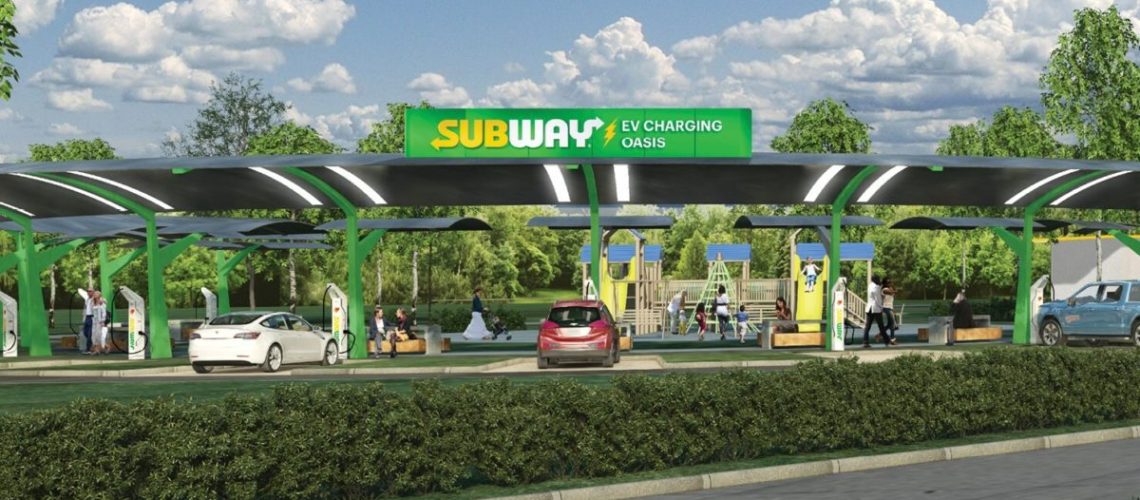The ultra-fast DC charging stations feature a lithium battery-based charging box that requires no grid infrastructure or hardware upgrades.
Grab a footlong sandwich and soft drink while the kids play in a playground as your EV battery gets fully topped off from an ultra-fast charger. That’s the utopian future GenZ EV Solutions and Subway Restaurants hope they are mapping out.
This week Miami-based GenZ EV Solutions, an EV charging development company, partnered with the national quick service sandwich franchise to pilot Subway EV Charging Oasis parks at new and existing restaurants. Using multiple charge ports, the Oasis parks will feature picnic tables, playgrounds, WiFi access and additional green space to allow customers to unwind while their EVs charge in what the charging company says is as little as 10 minutes.
GenZ EV Solutions and its EV charging network partner Red E Charge are deploying equipment using the battery-buffered fast charging equipment of ADS-Tec Energy, an EV charging infrastructure company that has operations in Dresden, Germany and Auburn, Alabama.
As part of its multi-year plan to rollout the Subway EV Charging Oasis, small format and fast EV charging stations will be piloted at select, new or newly remodeled Subway restaurants beginning this year. The charging stations are designed to offer added convenience for on-the-go guests, providing an environmental benefit solution and creating an additional revenue source for franchisee partners. Guests can also benefit from Subway promotions at charging stations.
“Equitable access to charging is essential to the adoption of EVs in the future and Subway’s scale will play an important role in democratizing charging infrastructure for millions of Americans,” said Jose Valls, chief executive officer of GenZ. “By coupling our technology and know-how with Red E Charge’s strategic relationships and Subway’s network of restaurants across the U.S., we are continuing to make key strides in building the EV infrastructure of tomorrow.”
Subway is partnering with franchisees for small-format EV charging stations as well as future Subway EV Charging Oasis parks.
ADS-Tec Energy’s fast charging equipment, the ChargePost and ChargeBox battery system, provide up to 320 kW of fast charging in grid systems with limited power capacity, the case in many U.S. cities. Currently the 140 kWh ChargePost systems are available globally by ADS-Tec distributors while the ChargeBox, with 201 kWh of power distribution capacity, is available across Europe. The products provide a full charge for EV users in as little as ten minutes.
The company’s battery-buffered charging system uses lithium-ion batteries behind the charge port connection, a configuration and technology that obviates the need for increased voltage capacity at the local grid level, allowing for fast charger deployments in urban environments with low power infrastructure systems. Other DC fast chargers from companies require additional power infrastructure to be installed such as rectifiers.
ADS-TEC Energy, based in Nurtingen, Germany, revealed plans in December to open a U.S. manufacturing facility in Alabama, creating 180 sales, warehousing and assembly jobs for the city. The company expects its new site to be fully functional by 2024, expanding its manufacturing operations out of Germany into the U.S. ADS-TEC plans to invest $8 million for the construction of its new site.
According to Plugshare, Red E Charge, GenZ’s charging network partner, is a Detroit, Mich.-based company that operates about 26 public charging stations in Michigan and South Dakota with 53 Level 2 charging ports and 17 DC fast charging ports.
In addition to tax credits for purchasing EVs, the Inflation Reduction Act pf 2022 renews tax credits for the installation of EV charging infrastructure in residential, commercial and industrial applications. The credit is for up to 30% of the costs of EV charging equipment. For businesses in designated areas though the credit is expanded from $30,000 to $100,000 per system starting this year. The Biden Administration’s goal is to achieve a national network of 500,000 EV charging stations by 2030.



